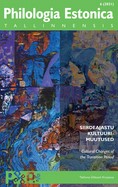Eesti punkluule ja siirdeajastu algus
Estonian punk poetry and the beginning of the transition period
Author(s): Piret ViiresSubject(s): Cultural history, Poetry, Political history, Estonian Literature, Post-War period (1950 - 1989), Transformation Period (1990 - 2010), Theory of Literature, History of Art
Published by: Tallinna Ülikooli Kirjastus
Keywords: punk poetry; transition period; literary canon; Singing Revolution; politically engaged literature (littérature engagée);
Summary/Abstract: The article discusses Estonian punk poetry, which is one of the most interesting literary phenomena during the beginning of the Estonian transition period. Punk poetry had become viable in Estonian culture from the early 1980s and its heyday was at the end of that decade. Punk poets utilised both literary and subcultural landscapes, their texts were powerful and intense, using unconventional poetic language, colloquialisms, obscene expressions and expressed sharp social criticism. Punk poetry developed quickly from a subcultural niche phenomenon into a politically engaged patriotic protest literature in the late 1980s and played a visible role during the Singing Revolution. At the same time, punk poetry entered vigorously the Estonian literary canon, changing and expanding it considerably: bringing new techniques and features to literature. Punk poetry was also a precursor to the literary upheavals of the 1990s. While the political engagement of punk poetry remains in the period of the Singing Revolution, its position in Estonian literary canon is secure. This is demonstrated by the analyses of punk poetry in literary history volumes, the inclusion of punk poetry in the national school curriculum, as well as, its treatment in several school textbooks.
Journal: Philologia Estonica Tallinnensis
- Issue Year: 6/2021
- Issue No: 1
- Page Range: 36-52
- Page Count: 17
- Language: Estonian

